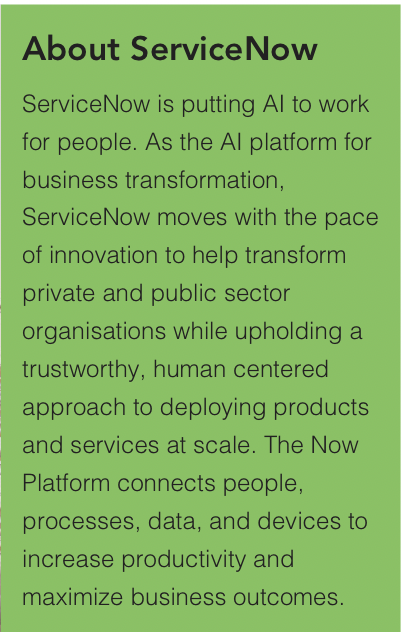Driving modernisation and digital transformation in the Irish public sector

Public Sector Lead at ServiceNow Ireland, Colm Dwyer, explores the benefits of a citizen-first approach that prioritises employee experience and purpose-based outcomes as key to building an innovative ecosystem in collaboration with the private sector.
 As our hyperconnected world rapidly evolves with artificial intelligence, data analytics, cloud computing, and 5G, the Irish public sector must embrace technology and modernise its processes.
As our hyperconnected world rapidly evolves with artificial intelligence, data analytics, cloud computing, and 5G, the Irish public sector must embrace technology and modernise its processes.
The Government’s unwavering commitment to digital transformation within public services is a clear recognition of the immediate opportunities innovative technologies can bring. However, its ambitious targets, including getting 90 per cent of services online by 2030, also imposes a heavy burden on the already stretched public sector.
The drive to digitally transform
As Minister for Public Expenditure, National Development Plan Delivery and Reform, Paschal Donohoe TD outlined in his speech at the Public Services 2024 conference earlier this year, transformation will not only enhance the resilience of the public service to face future challenges, but it will also enable the sector to apply modern working methods, increase capacity, and extend democratic participation resulting in more efficient and accessible government services for all citizens.
The Connecting Government 2030: A Digital and ICT Strategy and Harnessing Digital: The Digital Ireland Framework set out a roadmap for delivering digital government for all, benefiting society and the broader economy. Ireland is already in a strong position. As of the 2022 Digital Economy and Society Index (DESI) report, we are ranked the fifth most advanced digital economy in the EU.
We also placed in the top 10 international performers in the 2023 Digital Government Index (DGI) published by the OECD. Still, to continue the momentum and make further progress we have got a way to go when it comes to modernising our public services.
According to the European Commission’s 2024 State of the Digital Decade report, which uses DESI measures, Ireland is in danger of falling behind on digital public services for citizens, transparency of service delivery, design and personal data, and mobile friendliness.
Taking a citizen-first approach
Citizens want experiences that provide the answers they need; not bureaucracy. We are all now well accustomed to instant service in the palm of our hands, whether shopping, ordering food, or paying bills. Citizens want this same convenience when interacting with public services.
Akin to how businesses take a customer-first approach, government bodies need to provide self-service options at scale and build processes around outcomes rather than rooting citizens through various departments or offices. The first step toward a human-centred approach is offering unified experiences. Digitising multi-step paper journeys, for instance, means citizens can access public services on their smartphones on demand 24/7.
By the same token, modern IT systems allow citizens to see real-time status updates. Such solutions remove the frustration of trips to government buildings, and calls to jammed phone lines. What is more, simplified and seamless services not only enhance citizen satisfaction but also increase efficiency, which helps build governmental trust and transparency.
Foregrounding employee experience
Modernising systems and workflows from clunky legacy technologies and manual processing does not just improve citizens’ satisfaction – it boosts employee experience. Automating low-value, repetitive tasks, for example, improves the working lives of public sector staff, giving them more time to focus on high-value and engaging tasks. In addition to bolstering productivity, it creates a virtuous circle where happy employees provide better services to citizens.
Beyond day-to-day tasks, innovative public service technologies enable new ways of working, particularly flexible arrangements like remote and hybrid working. Heralded by the Department of Enterprise, Trade and Employment as a way to expand talent pools and increase participation, flexible working improves work-life balance and removes structural barriers for underrepresented demographics. As evidenced in the 2023 Labour Market Pulse, the share of women applying for remote or hybrid jobs more than doubled between 2021 and 2023.

Focusing on employee experience is also a way for public services to increase the success of technological modernisation efforts. Research from McKinsey, for instance, found the most successful public sector digital transformations deployed mechanisms focused on the employee 1.6 times more than those that failed.
However, it bears noting that prioritising employee experience to transform public services goes beyond tech and work-life balance. For change to be successful, employees must also be meaningfully engaged.
Prioritising purpose-based outcomes
ServiceNow’s extensive experience of working with the public sector across the EMEA region has taught us that digitalisation programmes fail when implemented with a highly centralised command-and-control management style. Time again, we have seen the best results when public sector leaders opt for a collaborative approach with cross-departmental cooperation and teamwork.
In practice, this means leaders track employee user journeys and collect and respond to feedback. In the same vein, only by checking in with its citizens can the public sector be sure it is doing what it set out to do.
Instead of returns on investment, leaders must target performance indicators that measure improvements in frictionless service delivery for citizens and employees – that way, they know they are delivering the right experiences.
The key to strategic public sector modernisation is adopting technology intelligently and measuredly. Still, for leaders, this is easier said than done. Knowing where to begin transforming ageing infrastructure, siloed record storage and outdated legacy systems is always challenging, not least when data privacy and national security issues are at stake.
Building an ecosystem of collaboration
At ServiceNow, we champion a collaborative ecosystem between the public and private sectors. In line with Enterprise Ireland, we recognise that innovation is the key to shared success in today’s rapidly evolving tech landscape.
As a trusted partner to governments worldwide, we know that long-term sustainable partnerships are essential to Ireland’s public sector mission of driving efficiency, modernising infrastructure, and improving outcomes for its employees, citizens, and society alike.

For more information:
E: colm.dwyer@servicenow.com
W: www.servicenow.com





